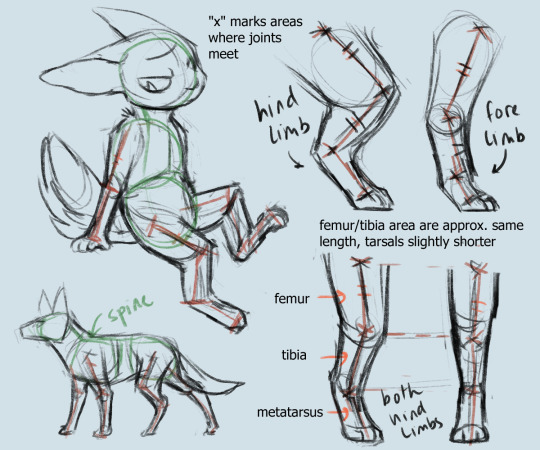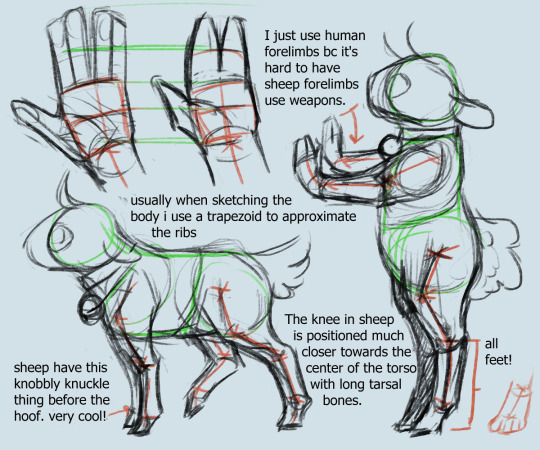#i wrote this at 3am so it may make no sense whatsoever oops
Explore tagged Tumblr posts
Note
Weird question for you 👉👈 do you have any drawings of the lamb or narinder like, naked? NOT in a horny way I SWEAR, I love your style and I just wanna see how you draw their legs lmao, I can't figure it out myself and other artists I can find are like, too human.
(nakey animals ahead)
Okay, so to preface this I'm a hobbyist artist who commits anatomical atrocities for shits & giggles, and this is by no means a professional/accurate way to draw animals, humans, or any combination of the two. This started as me struggling to explain how I draw instead of just sticking to the most brutally honest explanation of "I just wing it", but having to draw out different parts of anatomy and how proportional they are to each other was hugely helpful to help me re-evaluate how I draw animals. So thank you.
I'll be mostly using Lamb and Narinder for reference, because the brainrot is strong and they're what I draw the most.

A lot of my style comes from the fact that I'm primarily an animal artist, not a human one. In fact, COTL's the first fandom that I've drawn anthro characters in, and it was a trial trying to adapt what I know to upright animals.
Best way to get a better grip on anatomy is to sketch from references. Nothing that can really replace practice. It's helpful to look at skeleton and muscle diagrams and get a good idea of where body parts are in relation to each other. Then, search up actual references and try to overlay the shapes and bones onto them. When I'm not sure if something of mine is proportioned correctly, I just measure something with my fingers and compare.
Some specific things to note: generally, the hind legs of quadrupeds have a larger metatarsal area (the large flat portion of your foot) compared to humans--that's why people say cats tip-toe. Humans have theirs relatively short; how long you make that area largely determines how Creature the design looks. I know some people who draw purely human legs, some who draw human legs then add the extra foot length on top, all of that's fine. Personally, I will shorten the leg length above the knee to compensate. In quadrupeds, the knee will draw up very close to the torso area, as you can see in the jackal doodle.
Another note: when standing, it's important give the impression that there's a center of balance. When standing straight, a straight line drawn from the hip to the foot of a leg should be relatively perpendicular to the ground.
(Of course this all goes out the window the moment anything other than standing straight is involved but w/e.)

A lot of the fundamentals carry over between my quadruped and anthro art: the general shapes, the proportions, etc. One thing I noticed while sketching Lamb is that sheep have a femur that's almost entirely against their torso, and their legs are mostly just the tarsal parts (sorry if I'm butchering the anatomy).
For the arms/forelimbs, I mainly just use human anatomy with a repurposed number of fingers. It's easier, plus I can't exactly have a sheep with sheep limbs carry an axe around. I mean it's doable, just kinda awkward.

After getting the basics down, I move to more complex poses. One thing I struggle massively with is anything involving knees--kneels were something that eluded me for months. There are things that humans do that look very awkward when you factor in other animals' anatomies. I'm not super good with action poses so I can't really say how I've overcome that limitation, because I haven't :'D.
When I'm doing more simplistic poses, I just result resort to drawing a slightly bent line and calling it a day. You don't see much outside clothing anyways.

Last thing I found interesting: because of the weight distribution, the positioning of the arms in relation to the torso is different in bipeds and quadrupeds. Drawing anatomy with arms that kinda come forward and legs spread apart give designs a more animalistic vibe to me.
#long post#my asks#my shit#idk if this helps or not#it's just how i draw things not how to draw them correctly#i wrote this at 3am so it may make no sense whatsoever oops#but yeah i don't really??? do consistency??? so i constantly violate my own rules#reminder that my narinder is a jackal/cat hybrid#cw suggestive#not rlly but just in case
40 notes
·
View notes